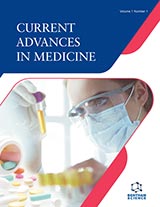Abstract
Triple-negative breast cancer is the most aggressive form of breast cancer
that lacks expression of estrogen, progesterone, and human epidermal growth factor
receptor 2. TNBC is characterized by poor clinic-pathological attributes, prognostic
markers, unavailability of efficient therapeutic approaches, and higher chances of
disease relapse along with metastasis to distant sites. Dysregulated epigenetic and
transcriptional profiling was involved in cancer progression including histone
modification, altered miRNA, DNA methylation, and long non-coding RNA signatures.
This chapter will provide an insight into the molecular biology of TNBC including
gene expression patterns and their subtypes. TNBC molecular spectrum was
extensively studied to depict the distant metastasis-free survival and overall survival
rate in affected individuals. Prevalence and epidemiology trends of TNBC patients
across the globe were also studied to determine the impact of genetic predisposition
and socioeconomic factors behind its aggressive behavior.






















